Ökonometrische Methoden für wirtschaftliche Prognosen und Simulationen
Der Forschungsschwerpunkt der Forschungsgruppe liegt in der Entwicklung ökonometrischer Methoden für Kurzfristprognosen (Reduzierte-Form-Modelle), für Regionalisierung und für Langfristprojektionen sowie für strukturelle Prognose- und Simulationsmodelle (DSGE-Modelle). Ferner erstellt sie ökonometrische Hintergrundanalysen für die Prognosetätigkeit der Forschungsgruppe Makroökonomische Analysen und Prognosen. Im Rahmen von Drittmittelprojekten wurden verschiedene makroökonomische Modelle, bspw. für die Volkswagen Financial Services AG oder im Rahmen von GIZ-Projekten für die Wirtschaftsministerien in Kirgistan und Tadschikistan sowie das Institut für makroökonomische Prognosen und Forschung (IFMR) in Usbekistan entwickelt.
IWH-Datenprojekt: IWH Real-time Database
Forschungscluster
Wirtschaftliche Dynamik und StabilitätIhr Kontakt

Mitglied - Abteilung Makroökonomik
PROJEKTE
07.2022 ‐ 12.2026
Evaluierung des InvKG und des Bundesprogrammes STARK
Bundesministerium für Wirtschaft und Klimaschutz (BMWK)
Im Auftrag des Bundesministeriums für Wirtschaft und Klimaschutz evaluieren das IWH und das RWI die Verwendung der rund 40 Milliarden Euro, mit denen der Bund die Kohleausstiegsregionen unterstützt.
10.2019 ‐ 01.2023
An Klimawandel angepasste Wirtschaftsentwicklung
Deutsche Gesellschaft für Internationale Zusammenarbeit (GIZ) GmbH
Der Klimawandel wirkt sich stark auf das Wirtschaftswachstum und die Entwicklung eines Landes aus. Das erhöht den Bedarf an verlässlichen und realisierbaren Ansätzen, mit denen die Auswirkungen von Klimarisiken und potenzielle Anpassungsszenarien bewertet werden können. Die politischen Entscheidungsträger*innen in den Planungs- und Wirtschaftsministerien benötigen fundierte Prognosen, um entsprechende wirtschaftspolitische Instrumente zu konzipieren, zu finanzieren und aktiv gegenzusteuern. In den Pilotländern Kasachstan, Vietnam und Georgien werden Klimarisiken bei der makroökonomischen Modellierung berücksichtigt. Die Ergebnisse werden so in den Politikprozess integriert, dass angepasste Wirtschaftsplanungen entstehen können. Das IWH-Team ist verantwortlich für die makroökonomische Modellierung in Vietnam.
05.2020 ‐ 09.2023
ENTRANCES: Energy Transitions from Coal and Carbon: Effects on Societies
Europäische Kommission
Ziel von ENTRANCES ist es, die Folgen des Kohleausstiegs in Europa zu untersuchen. Wie verändert der Kohleausstieg die Gesellschaft – und wie kann Politik darauf reagieren?
This project has received funding from the European Union’s Horizon 2020 research and innovation programme under grant agreement No 883947.
01.2018 ‐ 12.2023
EuropeAid (EU-Rahmenvertrag)
Europäische Kommission
07.2016 ‐ 12.2018
Klimaschutz und Kohleausstieg: Politische Strategien und Maßnahmen bis 2030 und darüber hinaus
Umweltbundesamt (UBA)
01.2017 ‐ 12.2017
Unterstützung einer nachhaltigen Wirtschaftsentwicklung in ausgewählten Regionen Usbekistans
Deutsche Gesellschaft für Internationale Zusammenarbeit (GIZ) GmbH
01.2017 ‐ 12.2017
Short-term Macroeconomic Forecasting Model in Ministry of Economic Development and Trade of Ukraine
Deutsche Gesellschaft für Internationale Zusammenarbeit (GIZ) GmbH
01.2016 ‐ 12.2017
Entwicklung eines analytischen Tools basierend auf einer Input-Output-Tabelle
Deutsche Gesellschaft für Internationale Zusammenarbeit (GIZ) GmbH
Das Ziel des Projektes war die Entwicklung eines Exceltools zur Wirkungsanalyse von Politikmaßnahmen in Tadschikistan basierend auf dem statischen Input-Output-Ansatz.
11.2015 ‐ 12.2016
Beschäftigung und Entwicklung in der Republik Usbekistan
Deutsche Gesellschaft für Internationale Zusammenarbeit (GIZ) GmbH
Förderung einer nachhaltigen wirtschaftlichen Entwicklung in ausgewählten Regionen Usbekistans
05.2016 ‐ 05.2016
Rahmenbedingungen und Finanzierungsmöglichkeiten für die Entwicklung des Privatsektors in Tadschikistan
Deutsche Gesellschaft für Internationale Zusammenarbeit (GIZ) GmbH
02.2016 ‐ 04.2016
Makroökonomische Reformen und umwelt- und sozialverträgliches Wachstum in Vietnam
Deutsche Gesellschaft für Internationale Zusammenarbeit (GIZ) GmbH
Referierte Publikationen
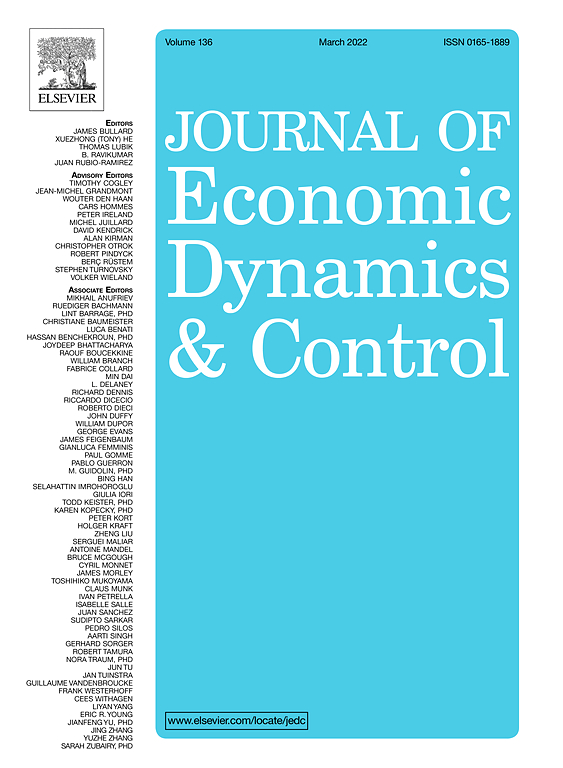
Epidemics in the New Keynesian Model
in: Journal of Economic Dynamics and Control, July 2022
Abstract
This paper documents the behavior of key macro aggregates in the wake of the Covid epidemic. We show that a unique feature of the Covid recession is that the peak-to-trough decline is roughly the same for consumption, investment, and output. In contrast to the 2008 recession, there was only a short-lived rise in financial stress that quickly subsided. Finally, there was mild deflation between the peak and the trough of the Covid recession. We argue that a New Keynesian model that explicitly incorporates epidemic dynamics captures these qualitative features of the Covid recession. A key feature of the model is that Covid acts like a negative shock to the demand for consumption and the supply of labor.
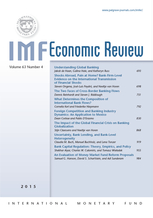
Inequality in Life and Death
in: IMF Economic Review, March 2022
Abstract
We argue that the COVID epidemic disproportionately affected the economic well-being and health of poor people. To disentangle the forces that generated this outcome, we construct a model that is consistent with the heterogeneous impact of the COVID recession on low- and high-income people. According to our model, two-thirds of the inequality in COVID deaths reflect preexisting inequality in comorbidity rates and access to quality health care. The remaining third stems from the fact that low-income people work in occupations where the risk of infection is high. Our model also implies that the rise in income inequality generated by the COVID epidemic reflects the nature of the goods that low-income people produce. Finally, we assess the health-income trade-offs associated with fiscal transfers to the poor and mandatory containment policies.
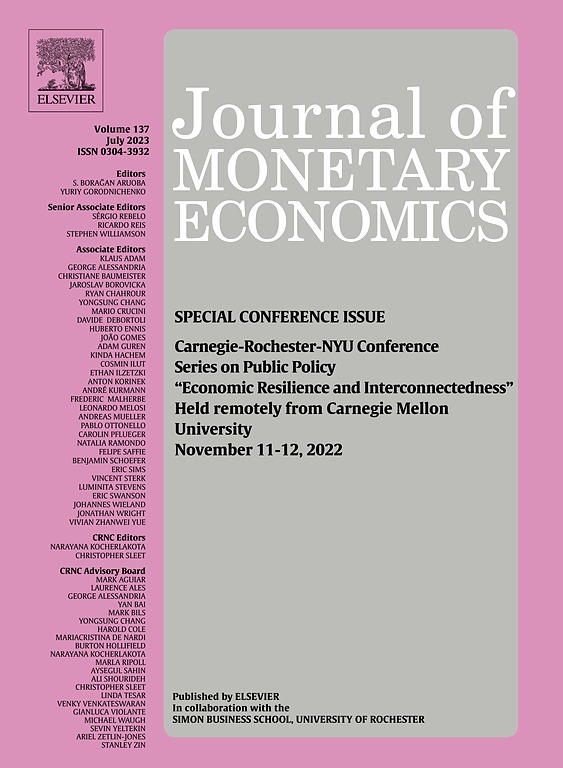
Resolving the Missing Deflation Puzzle
in: Journal of Monetary Economics, March 2022
Abstract
A resolution of the missing deflation puzzle is proposed. Our resolution stresses the importance of nonlinearities in price- and wage-setting when the economy is exposed to large shocks. We show that a nonlinear macroeconomic model with real rigidities resolves the missing deflation puzzle, while a linearized version of the same underlying nonlinear model fails to do so. In addition, our nonlinear model reproduces the skewness of inflation and other macroeconomic variables observed in post-war U.S. data. All told, our results caution against the common practice of using linearized models to study inflation and output dynamics.
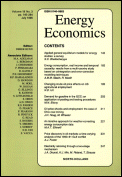
Power Generation and Structural Change: Quantifying Economic Effects of the Coal Phase-out in Germany
in: Energy Economics, 2021
Abstract
In the fight against global warming, the reduction of greenhouse gas emissions is a major objective. In particular, a decrease in electricity generation by coal could contribute to reducing CO2 emissions. We study potential economic consequences of a coal phase-out in Germany, using a multi-region dynamic general equilibrium model. Four regional phase-out scenarios before the end of 2040 are simulated. We find that the worst case phase-out scenario would lead to an increase in the aggregate unemployment rate by about 0.13 [0.09 minimum; 0.18 maximum] percentage points from 2020 to 2040. The effect on regional unemployment rates varies between 0.18 [0.13; 0.22] and 1.07 [1.00; 1.13] percentage points in the lignite regions. A faster coal phase-out can lead to a faster recovery. The coal phase-out leads to migration from German lignite regions to German non-lignite regions and reduces the labour force in the lignite regions by 10,100 [6300; 12,300] people by 2040. A coal phase-out until 2035 is not worse in terms of welfare, consumption and employment compared to a coal-exit until 2040.
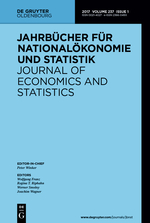
(Since when) are East and West German Business Cycles Synchronised?
in: Jahrbücher für Nationalökonomie und Statistik, Nr. 1, 2021
Abstract
We analyze whether, and since when, East and West German business cycles are synchronised. We investigate real GDP, unemployment rates and survey data as business cycle indicators and we employ several empirical methods. Overall, we find that the regional business cycles have synchronised over time. GDP-based indicators and survey data show a higher degree of synchronisation than the indicators based on unemployment rates. However, synchronisation among East and West German business cycles seems to have become weaker again recently.
Arbeitspapiere
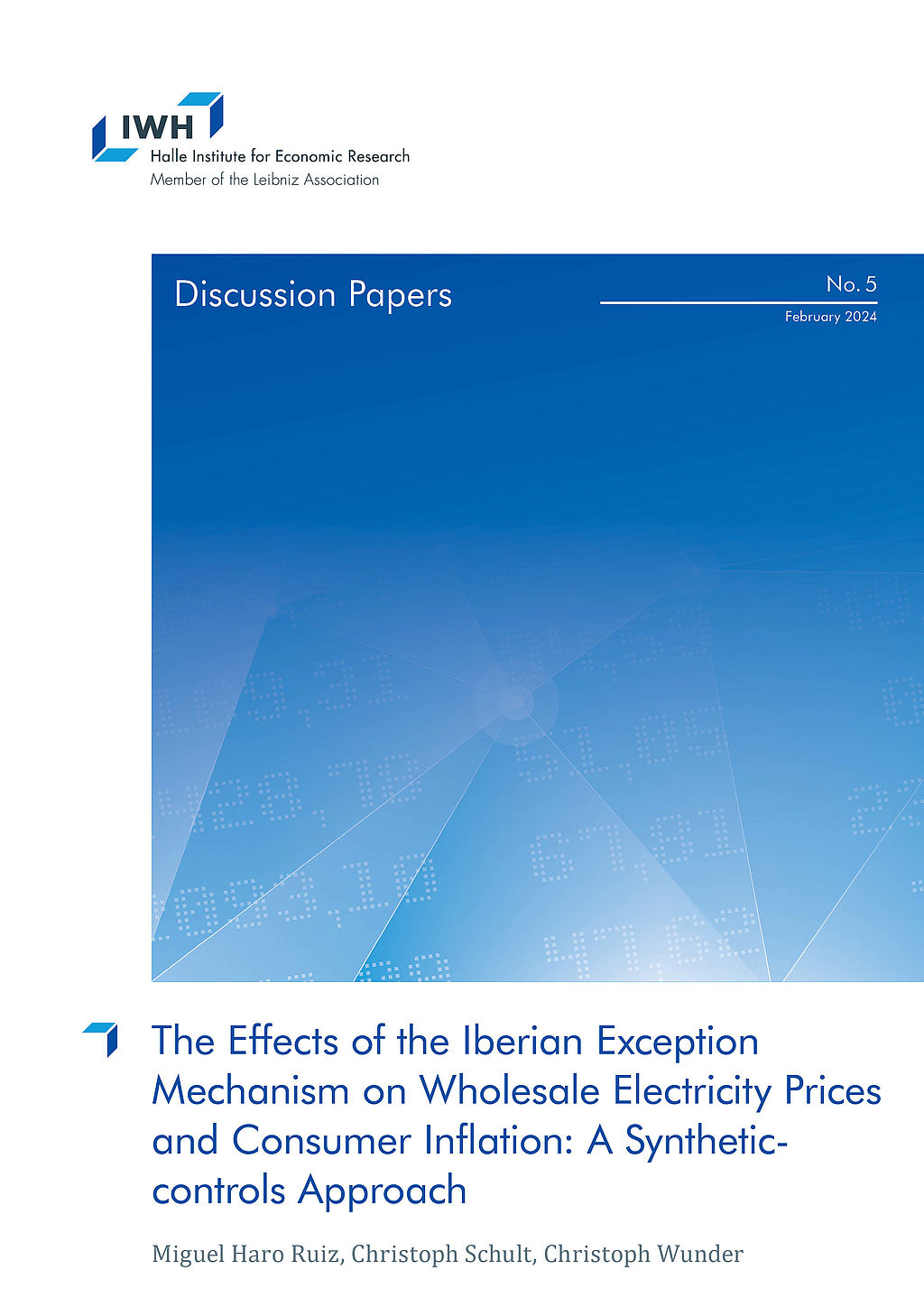
The Effects of the Iberian Exception Mechanism on Wholesale Electricity Prices and Consumer Inflation: A Synthetic-controls Approach
in: IWH Discussion Papers, Nr. 5, 2024
Abstract
This study employs synthetic control methods to estimate the effect of the Iberian exception mechanism on wholesale electricity prices and consumer inflation, for both Spain and Portugal. We find that the intervention led to an average reduction of approximately 40% in the spot price of electricity between July 2022 and June 2023 in both Spain and Portugal. Regarding overall inflation, we observe notable differences between the two countries. In Spain, the intervention has an immediate effect, and results in an average decrease of 3.5 percentage points over the twelve months under consideration. In Portugal, however, the impact is small and generally close to zero. Different electricity market structures in each country are a plausible explanation.
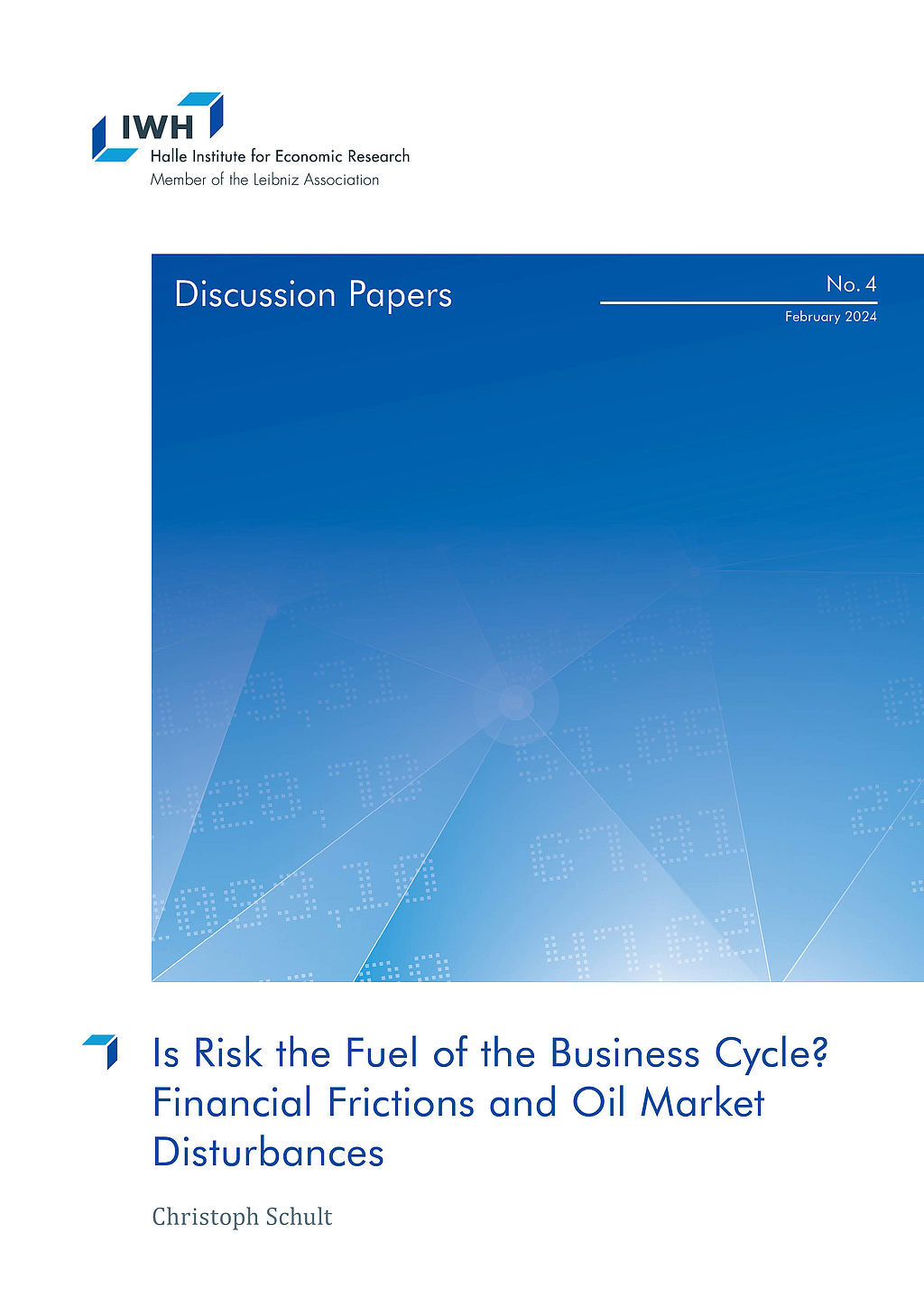
Is Risk the Fuel of the Business Cycle? Financial Frictions and Oil Market Disturbances
in: IWH Discussion Papers, Nr. 4, 2024
Abstract
I estimate a dynamic stochastic general equilibrium (DSGE) model for the United States that incorporates oil market shocks and risk shocks working through credit market frictions. The findings of this analysis indicate that risk shocks play a crucial role during the Great Recession and the Dot-Com bubble but not during other economic downturns. Credit market frictions do not amplify persistent oil market shocks. This result holds as long as entry and exit rates of entrepreneurs are independent of the business cycle.
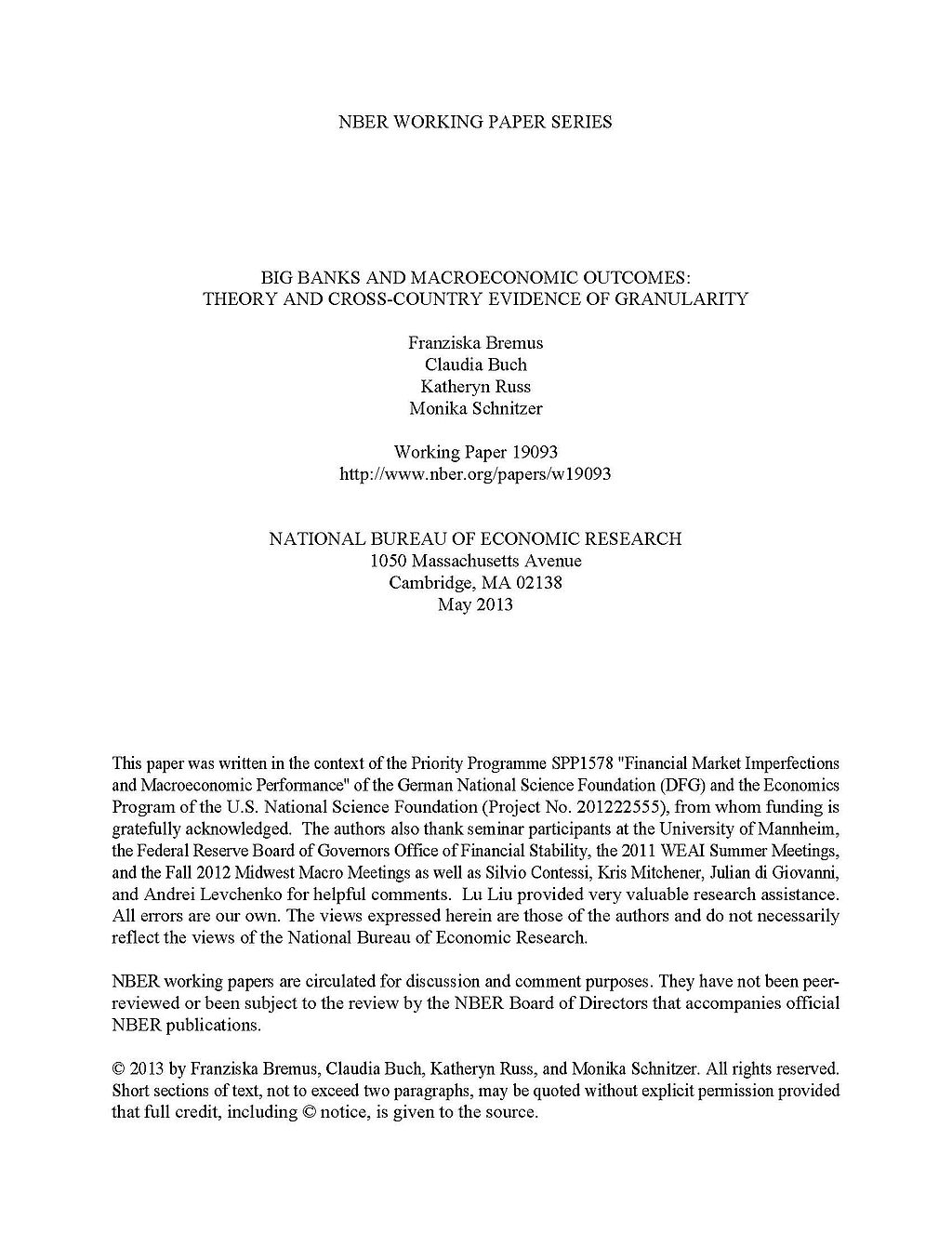
Expectations, Infections, and Economic Activity
in: NBER Working Paper, Nr. 27988, April 2022
Abstract
The Covid epidemic had a large impact on economic activity. In contrast, the dramatic decline in mortality from infectious diseases over the past 120 years had a small economic impact. We argue that people's response to successive Covid waves helps reconcile these two findings. Our analysis uses a unique administrative data set with anonymized monthly expenditures at the individual level that covers the first three Covid waves. Consumer expenditures fell by about the same amount in the first and third waves, even though the risk of getting infected was larger in the third wave. We find that people had pessimistic prior beliefs about the case-fatality rates that converged over time to the true case-fatality rates. Using a model where Covid is endemic, we show that the impact of Covid is small when people know the true case-fatality rate but large when people have empirically-plausible pessimistic prior beliefs about the case-fatality rate. These results reconcile the large economic impact of Covid with the small effect of the secular decline in mortality from infectious diseases estimated in the literature.
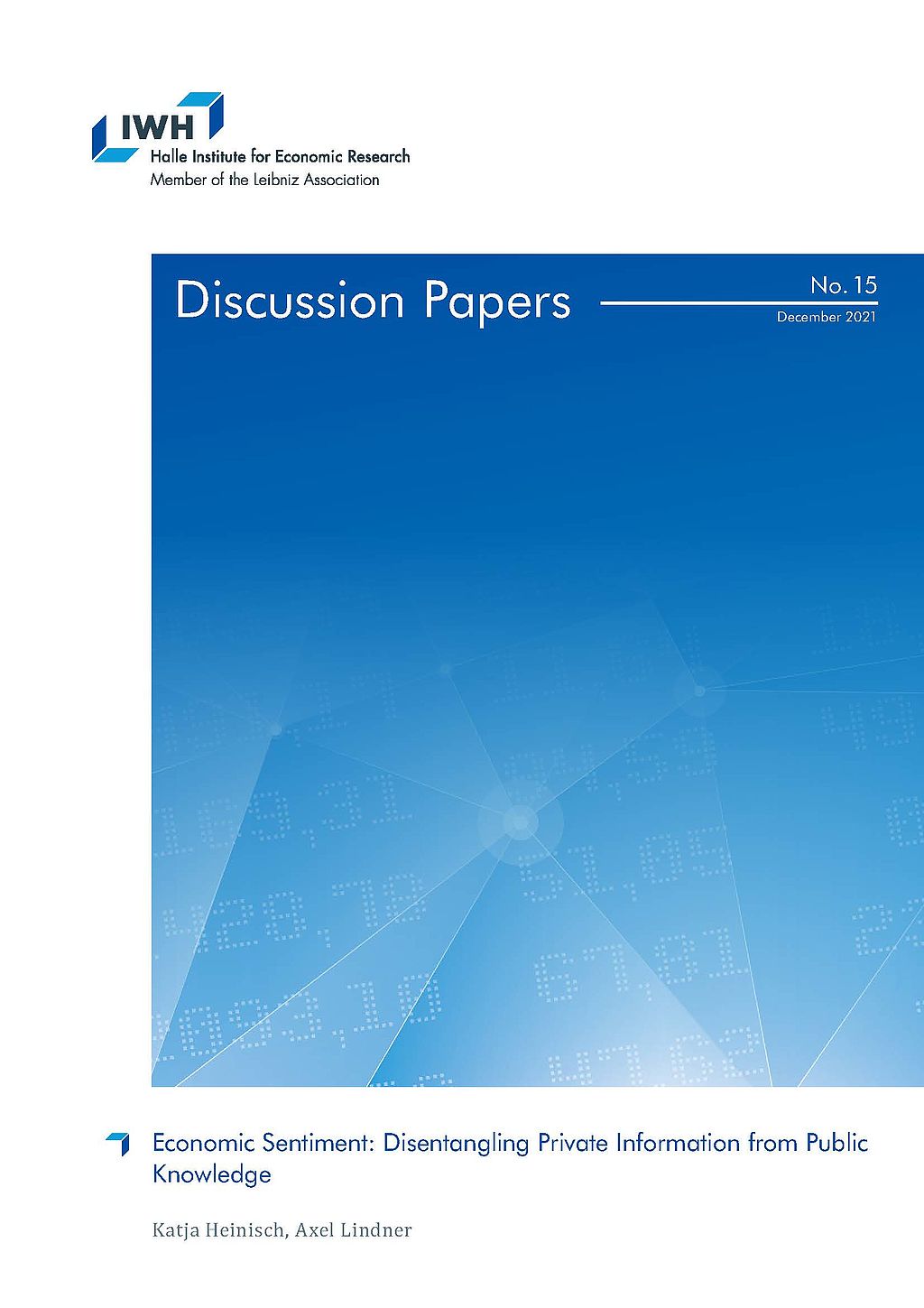
Economic Sentiment: Disentangling Private Information from Public Knowledge
in: IWH Discussion Papers, Nr. 15, 2021
Abstract
This paper addresses a general problem with the use of surveys as source of information about the state of an economy: Answers to surveys are highly dependent on information that is publicly available, while only additional information that is not already publicly known has the potential to improve a professional forecast. We propose a simple procedure to disentangle the private information of agents from knowledge that is already publicly known for surveys that ask for general as well as for private prospects. Our results reveal the potential of our proposed technique for the usage of European Commissions‘ consumer surveys for economic forecasting for Germany.
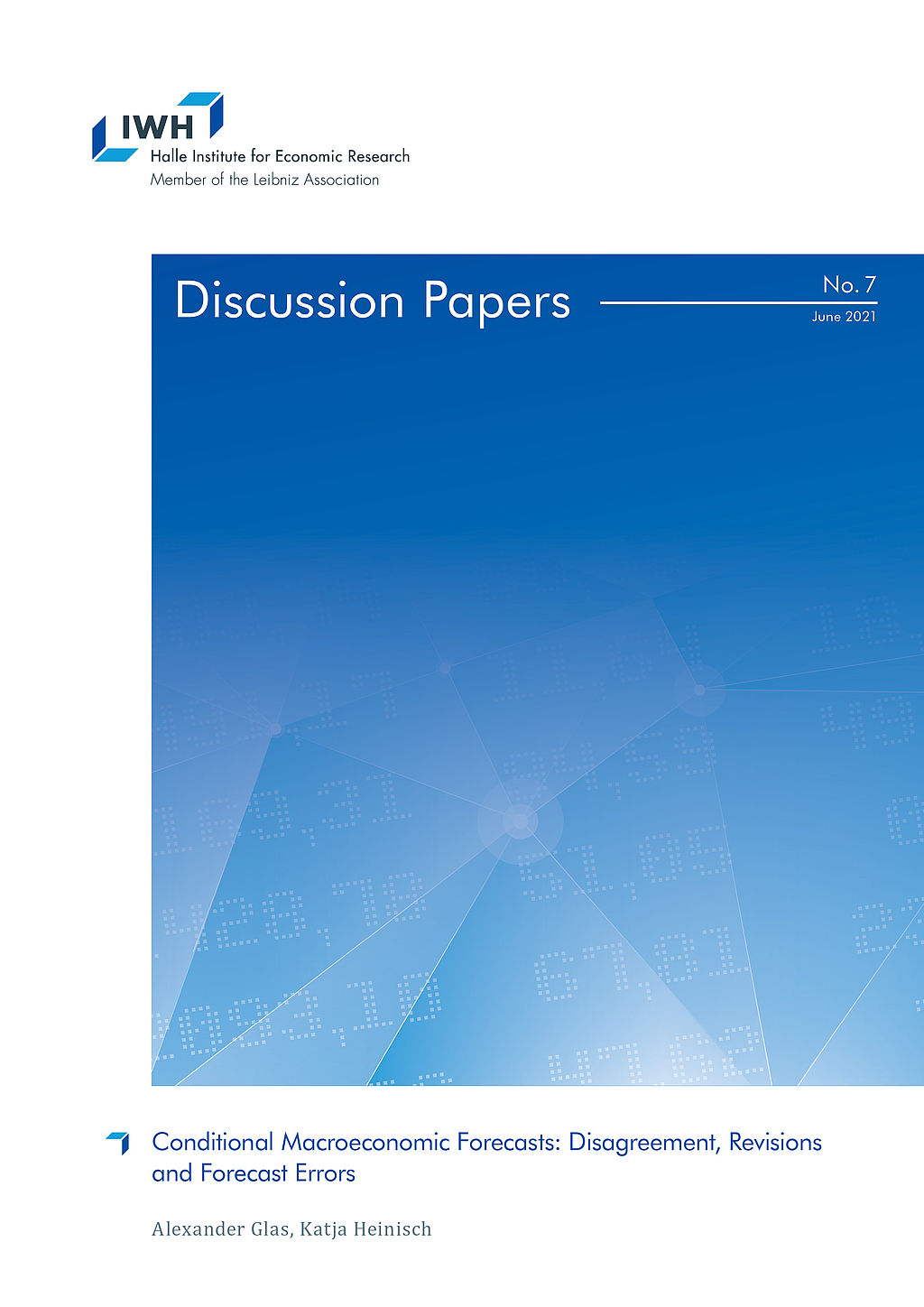
Conditional Macroeconomic Forecasts: Disagreement, Revisions and Forecast Errors
in: IWH Discussion Papers, Nr. 7, 2021
Abstract
Using data from the European Central Bank‘s Survey of Professional Forecasters, we analyse the role of ex-ante conditioning variables for macroeconomic forecasts. In particular, we test to which extent the heterogeneity, updating and ex-post performance of predictions for inflation, real GDP growth and the unemployment rate are related to assumptions about future oil prices, exchange rates, interest rates and wage growth. Our findings indicate that inflation forecasts are closely associated with oil price expectations, whereas expected interest rates are used primarily to predict output growth and unemployment. Expectations about exchange rates and wage growth also matter for macroeconomic forecasts, albeit less so than oil prices and interest rates. We show that survey participants can considerably improve forecast accuracy for macroeconomic outcomes by reducing prediction errors for external conditions. Our results contribute to a better understanding of the expectation formation process of experts.

















